NCERT Solutions for Class 4 EVS Chapter 13 A River’s Tale
NCERT PAGE NUMBER 106
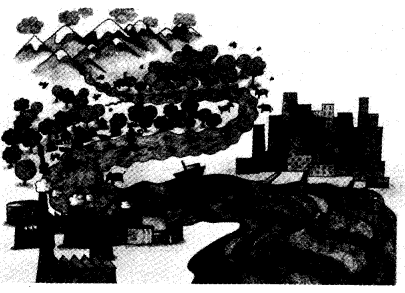
1. Look carefully at the picture of the river. Read the words given below. Use these words to make a story. Give a title to your story also.
Boat, flowing water, blue, fish, water-plants, river, foul smell, big ship, oil, river banks, factories, washing clothes, animals, other work, change, city.
Ans. Story
Long ago, there was a river full of clear blue water. There were lots of fish in the river. Some water plants were also in the river. A factory came up near the river. A city also developed in due course of time. Some big ship came in the river to supply goods to the factory. There was oil spill in the river. Effluents from factories were discarded into the river. Many people washed clothes and bathed animals in the river. This changed the river forever. The water became filthy and foul smelling. It was no longer a beautiful river
NCERT PAGE NUMBER 107
Look at the picture again and answer the following questions.
1.What is the colour of the river where it begins?
Ans. Water is colourless. But when you will see a river from a distance it will appear bluish.
2.At some places, there are many fish in the river, at others there are only a few and at some other places there are dead fish. What could be the reason for this? Discuss.
Ans. Fish need fresh water. At some places where river is not polluted there are many fish in river water. But at some places, mainly near the big towns, domestic wastes and factory wastes are also poured in the river. These wastes make the river polluted. Very few or dead fish are found because of polluted water.
3. What can be seen in the river before it reaches the village?
Ans. In the river large number of fish can be seen before it reaches the village.
4.At which places did the colour of the water in tjie river change?
Ans. The colour of river changes near the villages and towns.
5. Why did this happen? Discuss.
Ans. The change in the colour of river water is mainly due to pollution, which is being created by people by throwing their waste into the river.
6. Which of the places shown in the picture would you like to live in? Why?
Ans. I would like to live in the places which Eire not polluted in order to live a healthy life.
7. Would you like to change any of the things that you see in the picture? Why and how?
Ans. I would like to remove the waste from the banks and water of the river. Because of these wastes river water is getting polluted.
NCERT PAGE NUMBER 108-109
1. If you wanted to drink some water, from which part of the river would you like to drink? Why?
Ans. I would like to drink water at the upper reaches from the beginning of the river. The water near the source of a river is pure and uncontaminated.
2. In the last part of the picture the river flows into the sea. Have you ever seen the sea? Where? In a movie, or anywhere else?
Ans. Yes, I have seen the sea. I saw the sea in films also. Apart from that, I saw the sea when I was in Mumbai.
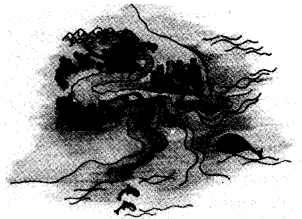
3. Have you ever been near a river or sea? When?
Ans. There is a river in my city and I often cross the river. I have been near a sea during my trip to Mumbai.
4. Show with your hands, how the waves in the sea move.
Ans. The waves moves up and down in the sea. (show the action)
5. Is the water from the sea drinkable? Why?
Ans. Sea water is not drinkable because it is saline.
6. Do you think that there would be changes taking place in a river, pond or stream at different times of the year?
Ans. Yes, there would be changes taking place in a river, pond or stream at different times of the year.
7. What kind of changes would these be? Discuss.
Ans. During the rainy season, the level of water in a river, pond or stream is at its maximum, while in the April and May the water level is at the minimum.
8. Will there be the same amount of water in the ponds or rivers during the rainy season and in summer?
Ans. Water in the rainy season will be more than in summer.
9. Is there a pond, river or lake near your town or city?
Ans. Yes, there is a river near my town.
Find Out
1. Are there any changes in the water during summers, the rainy season and in winters?
Ans. Yes, in summer water level decreases. In rainy season water is at its maximum level. In winters it is at the middle level.
2. What are the different kinds of fish found there?
Ans. There are several kinds of fish found there. A few of them are Rohu, Katla, etc. They are of various sizes.
3. What kind of trees and plants grow around it?
Ans. Mainly grasses grow around it.
4. What are the kinds of birds that come there?
Ans. Eagle, crow, swan, etc. come there.
5. Have you ever seen or read about floods? Where?
Ans. Yes. I saw flood, in Bihar.
6. What happens when there is a flood?
Ans. Houses, roads, railway tracks are inundated when there is a flood.
7. Have you seen dirty water in a river or pond?
Ans. Yes, I have seen dirty water in a river and in some ponds also.
8. How would you know if the water is dirty?
Ans. The dirty water looks muddy and gives bad smell.
9. If the water looks clean, can you be sure that it is alright to drink that water? Discuss.
Ans. If the water looks clean, it may not be safe to drink that. A clean looking water may contain germs.
NCERT PAGE NUMBER 110
How Does Water Become Dirty
1. From where do you get your drinking water? A/ river or a lake?
Ans. We get drinking water from a river.
2. Do you think that like the river in the picture your river or lake can also be affected?
Ans. Yes, river that is near my town is also affected by pollution.
3. Put / mark in the right places.
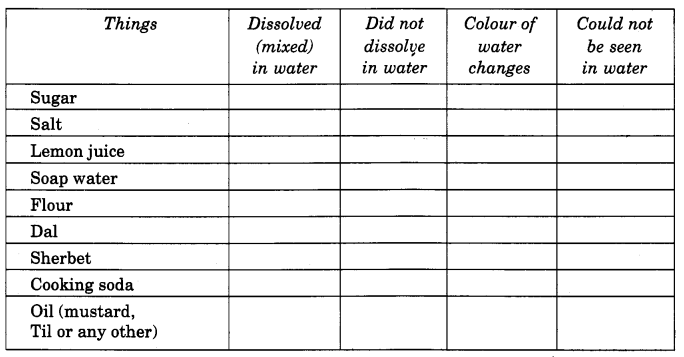
Ans.
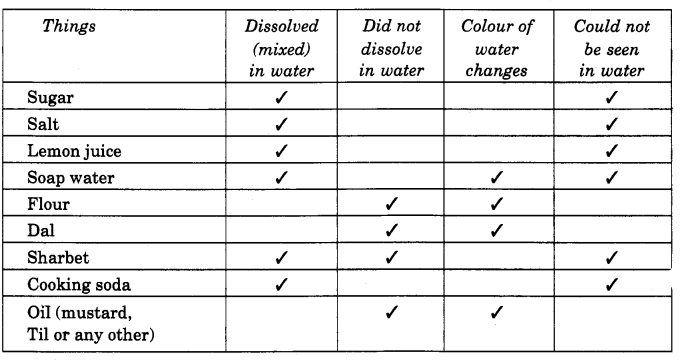
Now on the basis of your observations tell
4. Do all things dissolve in water?
Ans. No, not all things dissolve in water.
5. Does the colour of the water always change?
Ans. No, colour of water may not always change.
6. Did oil dissolve in water? How can you say whether it has dissolved or not?
Ans. No, oil did not dissolve in water. The things which do not dissolve in water either settle down or come up. For example, oirfloats on water.
7. Colour of the water may not change even after some things are dissolved in it. Would you say that these are absent in water?
Ans. If a thing is dissolved in water then it is present in water.
8. Imagine how it would be if things like sugar, salt, lemon juice, sherbet, etc., could not dissolve in water!
Ans. If things like sugar, salt, lemon juice, sherbet, etc. could not dissolve in water, we would not be able to cook food or have been things like tea, coffee, cold drinks, etc.
9. Imagine how it would be if things like stones, chalk, plastic and garbage would dissolve in water!
Ans. If things like stones, chalk, plastic and garbage would dissolve in water, then these things would make water dirty and, rather the world came to an end.
10 How is drinking water cleaned in your house?
Ans. We use water filter for getting clean drinking water.
11. Find out the many different ways of cleaning water at home.
Ans. Alum can be added to clean the water. Water is purified by the method of evaporation.
12.Draw pictures showing any two ways of cleaning the water.
Ans.
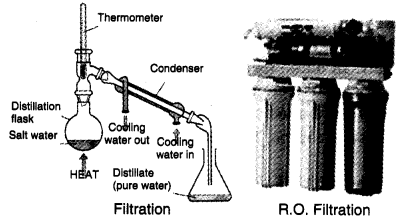
<!– –>
Comments are closed